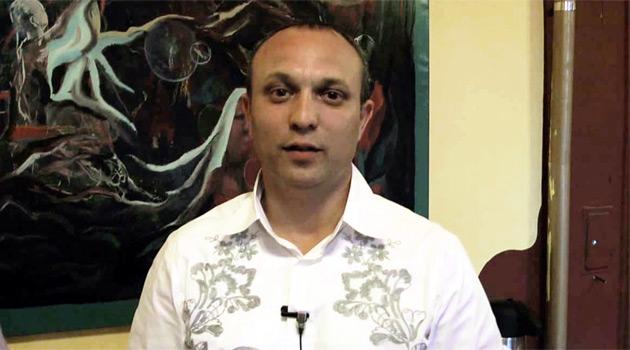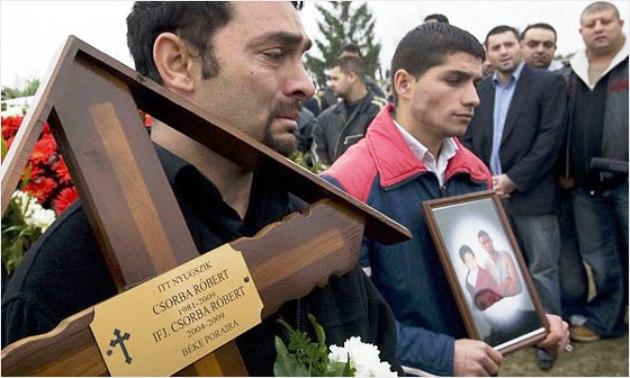Attila Balogh Hidvégi on serial murders in Hungary: Even brutal crimes did not spark Romani solidarity

In connection with the recent verdict of the Hungarian Supreme Court upholding life sentences for three perpetrators of the serial murders of Romani people in Hungary and a 13-year sentence for their accomplice, news server Romea.cz is presenting in translation the following commentary by Romani journalist Attila Balogh Hidvégi who, according to his account, has followed this scandal intensively from the beginning and is completely, thoroughly familiar not just with the text of the indictment, but also with the events that occurred between the various hearings in the case. Hidvégi published his commentary on www.romnet.hu and we are reprinting it in translation here in a shortened form with his kind permission:
The serial murders of Hungarian Roma and the subsequent course of the court proceedings about them have taught us a great deal. There has been much to learn, not just for Hungary
as such, but also for Romani society here.
It is known to us, because we have frequently reported on it, how various facts were suppressed in this case and what kinds of errors the police and secret services
made, sometimes even intentionally. We have been to all the funerals, we have seen the pain and tragedy of the victims.
It is six years since the wave of violent terror ended, but many people today are already approaching these events as if they happened 100 years ago, even though they
took place right where we live in the country we consider our home. Now the Supreme Court has handed down its final verdict in the matter.
This verdict is the culmination of an era, of a historical event. This was about nothing less than a historic change.
We only have chance and luck to thank for the fact that these "hunters" of Romani people shot dead a total of "just" six people and that they did not spark a civil war, which was their
original plan. I followed the entire investigation from beginning to end – the time period of the preparation of the indictment and its raising, all of the court
proceedings, and the time in between each verdict.
I dare say I am the journalist who has the greatest amount of information about this series of events, and probably the journalist who has published the most articles
about this topic. I have literally seen every page of this case.
Precisely on the basis of all this experience and knowledge, it has ultimately been confirmed to me that our Roma today are almost entirely lacking in any feeling of solidarity
with one another whatsoever – anything can happen and their patience will never run out, it is as if they take no interest at all in what is actually happening to them. I now understand
that everyday concerns and life are much more essential to them, that Romani people do not even want to see much of what is happening to them here.
Over the centuries and decades, including the quarter-century after the fall of the regime here, Romani people have been cheated many times, over and over. Romani
leaders, organizations, political parties and their pawns, as well as the so-called "ornamental Roma", those most indebted to the political regime who served its
interests at the expense of their own people, all these have long deceived and exploited their fellow Roma – but despite all this, there is one phenomenon for which there can be no excuse or explanation.
On 23 February 2009, just before dawn, neo-Nazis shot dead 27-year-old Róbert Csorba and his 4.5-year-old son in Tátárszentgyörgyi as they fled their burning home.
Hungary was shaken, shocked, several thousand people gathered at the catafalque to mourn the young boy in his father’s arms in a white coffin.
Precisely two months later, Jenő Kóka was shot dead in the courtyard of his home in Tiszalök as he was going to work. In the nearby settlement of Szabolcs and
neighboring villages there live a total of 5 000 Romani people who knew what was happening in Hungary – but no solidarity movement sprang up there to warn society of
what was going on, which was nothing less than a wave of violent terror.
Of those 5 000, less than 500 Romani people attended the funeral. Expressions of condolence were predominantly sent there from other parts of the country.
In August, on Holocaust Memorial Day, Mária Balogh was shot dead in her bed as she slept, and her 13-year-old daughter survived a gunshot wound. For her funeral, despite the fact that a large number of Romani people live there in Kislét, just 300 of them turned out.
Where have the Roma been all this time? If ex-police officers had not arrested the perpetrators of these crimes on 21 August, would anyone besides their family members even have attended
the memorial services for the Romani people murdered during these cold-blooded, planned attacks?
There should have been thousands of Romani people at all of these funerals, and those same people should still be holding remembrance events in their thousands. That
would be the kind of message and position that would have had – then and still today – some kind of social effect.
The Supreme Court has decided: These murderers will never leave their maximum-security cells. The biggest courtroom the Supreme Court has was almost empty when that
verdict was announced.
I counted less than five Romani activists or public officials who were there. The same cannot be said of the skinheads, who traveled all the way from Debrecen to attend their
friends’ hearing.
This time the skinheads did not wear t-shirts reading "Heroes", but clothing with the emblem of their "hunting club", which depicts a machine gun. They proudly
displayed their arm and neck tattoos, most of them Nazi symbols.
The right-wing radical György Budaházy was also sitting in the courtroom, who has been charged, among other things, with terrorism. The ultra-right website
kurucinfó.hu reported on the events, but Romani journalists were not there.
I am convinced that if a sense of self-esteem were still alive in Romani people – "pat’iv", honor, respect, solidarity – and if they were capable of assessing and calculating the value of some events, there would be hundreds if not thousands of them present at such an occasion. They would be standing in front of the building of
the Supreme Court, no matter the weather, waiting for the verdict to be handed down.
Even in a situation where it was apparent that the verdict could not end otherwise than in an upholding of the life sentences, they would be there. They would
demonstrate and prove that these murders have impacted hundreds of thousands of Romani people who have been living for months in fear, never knowing which of their
homes these murderers might attack next or whether a bottle filled with gasoline might not catch fire in their own dwelling.
They would demonstrate, prove and show that the six murder victims, including young Robik Csorba, have the status of martyrs in their eyes, blood sacrifices that cause
them the same pain and sorrow as the pointless death of a Hungarian teacher or Romanian volleyball player. Their silent attendance at such demonstrations, without words, would
tell the world that a Romani victim is a human being too, that Romani life has the same value as the life of a white-skinned person.
We would make people aware that we will not allow our genocide, we will not surrender to the forces that are recruiting members for that purpose. However, Romani
people today, just like before, are silent.
Their faces were not there to be seen, their voices were not there to be heard. All those kitchen-table political leaders, those world champions at prattling away on
Facebook, those false prophets hiding behind slogans of protecting our interests and our rights, those self-appointed Romani leaders desiring a daily bath in the
reflections of fame, those Romani organizations or political parties – none of them scrambled over to the courtroom to hear the final verdict of the high court instance that
brought this historic event to a close.
They were not there because there was no financial gain to be had from going, because they believed their attendance would not gain them anything. For these people it is not
a value to bear witness in favor of humanity or respect.
Concepts like empathy, piety or solidarity mean nothing even to the Romani residents of the capital these days – nothing to the doctoral students or the intellectuals, nothing to the unemployed or the workers. A generation is growing up here without any feelings or values.
Today the serial murderers of Romani people got the punishment they deserved. Unfortunately, we will never learn who might be the ideological leaders, planners and
sponsors of these attacks or their accomplices, and more specifically, we will never learn what led the police and secret services not to perform their work properly.
The question is whether now, after this verdict has taken effect, we can finally breathe a sigh of relief. Do we now have a reason to spread out comfortably in our
armchairs, is it enough just to listen to a news item about the judgment on television and then spout off about it on Facebook?
Is it possible to believe that this wave of terror will not repeat itself? Can we be sure that people will not be found to carry on these attempts, people who might
actually ultimately spark a civil war through serial violence?
Will the police and secret services perform their work from now on as is proper and right? Who will satisfactorily answer all of our questions?
Who will it be, and when? Don’t you believe the time has come to finally somehow actually unite so we can face down this wickedness?
Is this really the moral message you want to send to your children? I am calling on all of you to wake up before it is too late, so we don’t have to start going to any
more such funerals or trials!
This is a shortened, translated version of the original. Romea.cz thanks the editors of Romnet.hu for permission to shorten and translate the author’s article.
